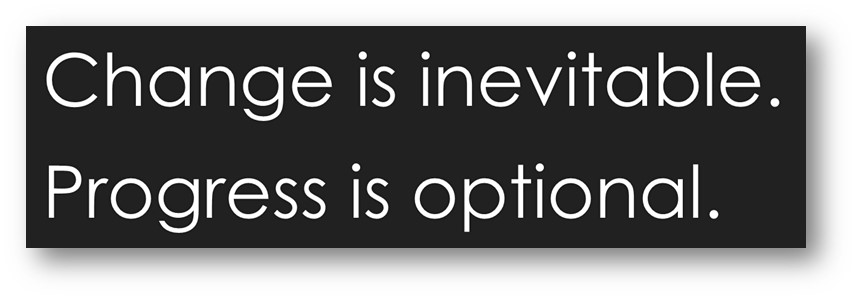
There is an old saying that most people believe: "People hate change."
When I am trying to help companies consider paths to ongoing improvement, I frequently challenge the management team's adherence to the belief in this seemingly axiomatic presumption.
"People do not hate change," I will opine.
This statement is variously met with smiles, snickers, rolling eyes and similar signals of disbelief.
So, many times, the conversation will proceed something along these lines:
"By show of hands, how many in this room are married?"
Usually, several—generally, almost all—hands go up.
My next question: "So, was getting married a major change for you?"
Heads nod, "Yes." Smirks all around show their agreement.
My third question: "Tell me: for all of you who got married, how many of you can tell me you really 'hated' that impending change?"
Nearly all shake their heads, "No," accompanied by grins.
Then, on only one occasion, someone said to me, "That's not a good example. Let's move on."
Okay. Let's move on.
There are, quite literally, hundreds of other examples that might be raised to affirm that people do not, in fact, "hate change."
If people hated change, for example, we might expect the following changes in behavior:
- People would never say, "I'm tired of this."
- People would not (voluntarily) go shopping for a new car.
- People would wear the same things, day after day.
- People would never (voluntarily) go looking for a new job.
- People would tend to eat the same foods day after day.
- People would avoid growth—because any kind of growth is change.
- People would avoid improvements—because any kind of improvement requires change.
- People would not make New Year's resolutions about what they want to change in the coming year.
Are there those who truly "hate change"?
Yes, there probably are.
LinkedIn Contributor, Mickey Granot says that he believes real resistance to change "exists in two cases only":
1. For a very small portion of the population, you might call social sociopaths, it is in their nature.
2. In social systems (like companies) when the accumulated experience with previous changes is very negative."
This is a point worth considering: what is "the accumulated experience with previous changes" at your company, or in the supply chain, where you manage?
Is it possible that so much change effort and so few positive results from the effort has produced negativity about change?
What do you think?
Are you ready for change? Contact RKL eSolutions if you are ready to assess your current business management software situation.



